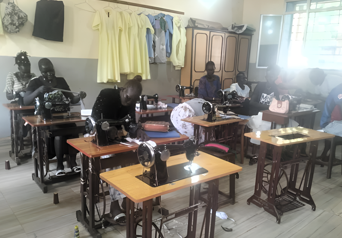In South Sudan, the future is walking on two feet, young, ambitious, and brimming with untapped potential. But potential alone does not build livelihoods; it requires opportunities, relevant skills, and a fair shot at the market.
This is where the Skill Up!+ programme by Welthungerhilfe (WHH) in South Sudan plays a transformative role. Aligned with this year’s International Youth Day theme, “Local Youth Actions for the SDGs and Beyond,” the programme demonstrates that when young people take charge of their futures, they propel the whole country closer to achieving global development goals.
Welthungerhilfe is one of the largest private aid agencies in Germany, politically and religiously independent. The organisation fights for “Zero Hunger by 2030”. Since being founded in 1962, it has provided funding of EUR 5.42 billion for more than 12.777 overseas projects in 70 countries.
Young people form the backbone of South Sudan’s workforce, with over 70% of the population under 30. Yet, youth unemployment remains high, estimated at above 35% nationally, and higher in post-conflict states such as Northern Bahr El Ghazal. Through Skill Up!+, WHH provides training in business management, entrepreneurship, and vocational technical trades. In Wau, for example, out of 90 participants, 30 are young women learning tailoring, catering, and other vocational skills in partnership with Don Bosco Vocational Training Centre, transforming not just their prospects but also their families’ stability.
In addition, 50 youth (20 male and 30 female) under enterprise groups are currently receiving entrepreneurship development training from WHH, complementing the 90 trainees enrolled at Don Bosco.
WHH’s approach goes beyond teaching skills; it focuses on turning those skills into income. Training graduates receive start-up kits such as tailoring machines, carpentry tools, or toolboxes and join strengthened Village Savings and Loan Associations (VSLAs) for access to finance. In 2025, 140 youth are set to receive start-up kits, while many others will be linked to employers, private sector actors, and TVET networks for apprenticeships and internships. This ensures graduates are not just learning, they are earning.
The journey is not without obstacles. Many young women continue to face deep-rooted gender norms that limit their participation in trades such as welding, carpentry, or mechanics. Others are hindered by low literacy and numeracy skills, making it difficult to enroll in formal training. Economic pressures force some participants to leave mid-training to care for their families, while the scarcity of local training facilities creates dependence on external providers. To address these barriers, WHH has adopted a multi-pronged approach offering flexible training schedules to accommodate family responsibilities, actively prioritizing female enrollment, and promoting community ownership to ensure fairness and sustainability. As a result, female participation in Skill Up!+ in South Sudan has risen to 43%, up from 15% in previous projects, ensuring the benefits of vocational skilling extend across gender, geography, and literacy levels, a tangible step toward the Sustainable Development Goals’ pledge to “leave no one behind.”
This work in South Sudan is part of the wider Skill Up! Programme, implemented in 15 countries through 17 projects. All projects follow the Skill Up! approach, which combines vocational training offered in various formats such as formal, non-formal, and mobile training with tailored support services that help young people transition into employment or self-employment. These services include career counselling, mentoring, internships, job placement, business development, and access to finance. This holistic model not only equips youth with market-relevant skills but also provides the tools and networks they need to succeed in competitive markets.
South Sudan’s story stands as a compelling example of how local action drives transformation. It is embodied in a young woman who, after completing carpentry training, earns her first income crafting school desks, and in a youth-led agribusiness in Northern Bahr El Ghazal that reinvests its profits to expand operations and create jobs for fellow young people. When communities invest in their youth, the impact reaches far beyond individual livelihoods; it creates ripples of change that strengthen households, uplift villages, and shape the nation’s future.
In 2024 alone, Welthungerhilfe supported about 18.7 million people with its 649 overseas projects in 37 countries. In real terms, that means: Many people now harvest more and can therefore improve their diets. They now have clean drinking water or toilets at home, which leaves them less susceptible to illness. Others are earning or producing more and can begin an education. For the children, Welthungerhilfe’s support means a chance of improved physical and mental development.
Welthungerhilfe bases its efforts on the principle of empowering people to help themselves, which it implements with measures ranging from rapid disaster relief to rehabilitation to long-term development cooperation projects with national and international partner organisations.




